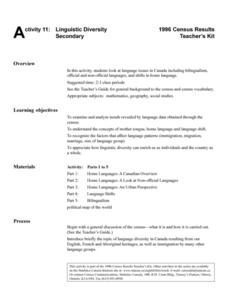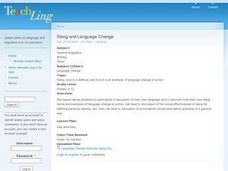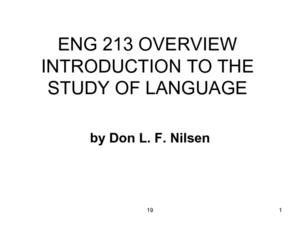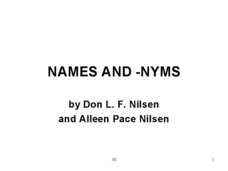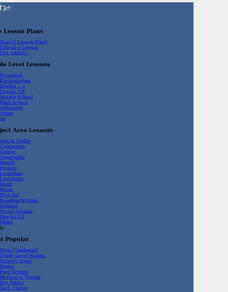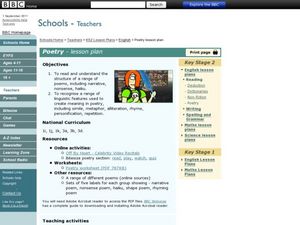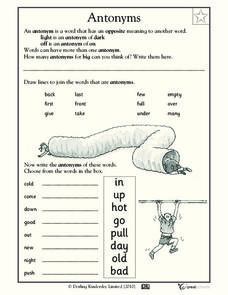Curated OER
Linguistic Diversity Secondary
Don't be scared off by the title! Read this information packet with your class, or send them off on their own. After each section, you'll find a series of comprehension questions. Great preparation for state testing!
Curated OER
Sentence Combining
Learners practice sentence combining at increasingly difficult levels throughout a week. They begin with nouns and verbs and build to contrasts, parallels, etc.
Curated OER
Who Invented English Anyway?
In these English lesson plans, students use video, the Internet and non-fiction essays to research the history of the English language. They write a short research paper and design a PowerPoint presentation showcasing their findings.
Curated OER
Keep Your English Up to Date: Wannabe
Language is a fluid and ever-changing entity! Take a week to cover the changing English expressions and slang as related to the word "wannabe." Go through vocabulary, spelling, worksheets, and quizzes on the topics with your class.
Curated OER
English as a Global Language
A discussion of English as a global language is presented in these slides, along with a history of the English language's influence on other cultures throughout the 20th century. The presentation also provides reasons why English makes a...
Curated OER
Slang and Language Change
Slang, as an example of language change in action, is the focus of a short lesson that asks learners to contribute examples to a class list of terms that they use to separate themselves from other groups or adults. Consider expanding the...
Curated OER
Eng 312: Final Exam
When paired with other powerpoints by Don L.F. Nilsen, this final exam covers topics addressed throughout previous lectures (slide 14 specifies which lectures should be reviewed). Teachers could use this presentation to craft their own...
Curated OER
Linguistic Humor and Language Play
By George, there are so many literary devices illustrated here! Help your pupils create interest in their writing by presenting one or two of these literary devices at a time. The slides contain examples and beg participation from the...
Curated OER
Word Connections
Students explore the science of word associations. They take a memory quiz, read articles on how the brain processes language, explore the concept of false memories and create and illustrate their own original word associations.
Curated OER
Introduction to the Study of Language
Though the presentation doesn't have any actual information, these slides detail the reading requirements and exam schedule of a sixteen-week class on the study of language. If you are planning a class on this topic, the presentation...
Curated OER
History of English
Providing both a history of English before England (Sino-Tibetan, Finno-Ugric, Hamido-Semitic, Indo-European) and a history of English in England, this presentation includes charts and many examples of the changes in the English language...
Curated OER
An English-Speaking World
An overview of the development of English as a global language fills out these slides. Beginning with statistics regarding how much of the world speaks English and to what capacity, a brief history is then given mostly pertaining to WWII...
Curated OER
Names and -Nyms
If you are teaching a class about language, this presentation about names and -nyms might be helpful. It is long enough to be broken into several different class sessions and addresses place names, stage names, surnames, and naming...
Curated OER
Phonetics: The Study of Speech Sounds
A beginning study of linguistics will include phonetics and the way sound is made. Show your class these great slides with pictures and examples of consonants, vowels, and blends. Placement of the tongue, lips, etc. are displayed to give...
Curated OER
Understanding Points of View
Investigate the importance of author's point of view. Young linguists study primary source documents related to the Treaty of Casco Bay. The first source is authored by the Native American Chiefs, the second by an English...
Curated OER
Irregular Formal Commands
After learning the regular formal commands for the Spanish language, your linguists should learn the irregular formal commands. First, they complete the chart with select irregular verbs like ir, caber, and caer. Then, in the second...
Curated OER
Structure of Natural Narratives
Class pairs select a prompt from a provided list and tell (and record) their story to their partner. They then examine linguist William Labov's model for natural narratives, and apply his model to their tale. Next, class members watch...
Curated OER
Language with Linguistic Legos
Middle schoolers visualize and manipulate sentences as building blocks, and, given a key, use Legos™ to demonstrate how to construct sentences of variety (simple, compound, complex, and compound-complex).
Curated OER
The Abstraction Ladder (Using Examples in Essays)
Students examine and discuss most appropriate format for giving examples in the American discourse style.
Curated OER
Different Types of Poetry
Provide pupils samples of different types of poems including haikus, narrative, nonsense, shape, and rhyming poems. In groups, class members read the poems, establish their general meaning, identify poetic devices, and rate the poems,...
Curated OER
Keep Your English Up to Date: Chav
Take a look at linguistics and stereotypes in Great Britian with a word study of "chav." Learners find out what terms are pejoratives and what they are meant to convey. Geared toward British culture, study the ever-changing English...
Curated OER
Sneetches: Diversity of Learners
For Learners wanting to practice verbal/linguistic intelligence, any Dr. Seuss book is an excellent text for examining rhyming words. They explore words that rhyme with bully, mean, snooty, nasty, tease, harass, hurt.
Curated OER
Irony
Using examples from Socrates to Johnny Carson, this slideshow presents your students with the history and definition of dramatic irony, satire, situational irony, and tragic irony. This presentation would be useful in a language arts...
Curated OER
Antonyms
Familiarize linguists with antonyms as they examine examples and match up opposites. First, scholars read a short description of antonyms, writing as many antonyms for big as they can. Then, they match up pairs of words that are antonyms...
Other popular searches
- Linguistics Activities
- Anthropology Linguistics
- English Linguistics
- Teaching Linguistics
- Spanish Linguistics
- Linguistics and Slang
- Linguistics and Culture
- Linguistics in Science
- Applied Linguistics
- Linguistics Language
- Teaching Linguistics to Ell
- Linguistics Nell


